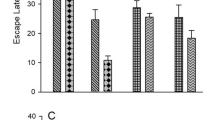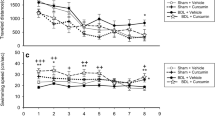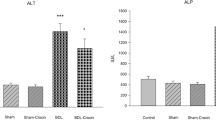Abstract
Large evidence has shown that cholestasis has a wide-range of deleterious effects on brain function, and also, on neurocognitive functions including learning and memory. On the other hand, crocin (derived from Crocus sativus) is a medicinal natural compound that induces neuroprotective and precognitive effects. In this study, we aimed to evaluate the effect of crocin on spatial learning and memory in cholestatic rats with respect to the level of mitochondrial transcriptional factor A (TFAM), peroxisome proliferator-activated receptor γ coactivator-1α (PGC-1α), catalase (CAT), and superoxide dismutase (SOD) in the hippocampus of male Wistar rats. Bile duct ligation (BDL) was used to induce cholestasis. Y-maze apparatus was used to assess spatial memory performance and real-time PCR was used to assess TFAM and PGC-1α gene expression. Also, crocin was injected intraperitoneal at the doses of 15, 20, and 30 mg/kg for thirty days. The results showed that BDL impaired spatial memory in rats. BDL also decreased SOD, TFAM, and PGC-1α level. In addition, crocin partially reversed the impairment effect of BDL on spatial memory. Crocin (30 mg/kg) also reversed the effect of BDL on SOD, TFAM, and PGC-1α. Of note, the effect of BDL on CAT activity was controversial. It seems that BDL can increase CAT activity. In addition, crocin (30 mg/kg) reversed the enhancement of CAT following BDL to its control level. In conclusion, crocin may induce a significant neuroprotective effect on cholestasis-induced memory impairment.


Similar content being viewed by others
Data availability
Will be made available upon a reasonable request.
References
Aktas C, Kanter M, Erboga M, Mete R, Oran M (2014) Melatonin attenuates oxidative stress, liver damage and hepatocyte apoptosis after bile-duct ligation in rats. Toxicol Ind Health 30(9):835–844. doi:https://doi.org/10.1177/0748233712464811
Altinoz E, Erdemli ME, Gul M, Aksungur Z, Gul S, Bag HG, Kaya GB, Turkoz Y (2018) Neuroprotection against CCl4 induced brain damage with crocin in Wistar rats. Biotech Histochem 93(8):623–631. doi:https://doi.org/10.1080/10520295.2018.1519725
Arduini A, Serviddio G, Escobar J, Tormos AM, Bellanti F, Vina J, Monsalve M, Sastre J (2011) Mitochondrial biogenesis fails in secondary biliary cirrhosis in rats leading to mitochondrial DNA depletion and deletions. Am J Physiol Gastrointest Liver Physiol 301(1):G119–127. doi:https://doi.org/10.1152/ajpgi.00253.2010
Beiki S, Tavakkol-Afshari J, Shariati-Sarabi Z, Poursamimi J, Gowhari Shabgah A, Mohammadi M (2022) A significant reduction in the plasma levels and gene expression of CCL2 in patients with osteoarthritis following intervention with Krocina. Rep Biochem Mol Biol 11(1):10–19. doi:https://doi.org/10.52547/rbmb.11.1.10
Eteghadi MR, Nasehi M, Vaseghi S, Hesami-Tackallou S (2021) The effect of Crocin on TFAM and PGC-1alpha expression and catalase and superoxide dismutase activities following cholestasis-induced neuroinflammation in the striatum of male Wistar rats. Metab Brain Dis 36(7):1791–1801. doi:https://doi.org/10.1007/s11011-021-00748-x
Farhadi L, Hojati V, Khaksari M, Vaezi G (2022) Neuroprotective Effects of Crocin against ethanol neurotoxicity in the animal model of fetal Alcohol Spectrum Disorders. Neurochem Res 47(4):1001–1011. doi:https://doi.org/10.1007/s11064-021-03501-z
Garcia-Moreno LM, Conejo NM, Gonzalez-Pardo H, Aller MA, Nava MP, Arias J, Arias JL (2005) Evaluation of two experimental models of hepatic encephalopathy in rats. Braz J Med Biol Res 38(1):127–132. doi:https://doi.org/10.1590/s0100-879x2005000100019
Golshani M, Basiri M, Shabani M, Aghaei I, Asadi-Shekaari M (2019) Effects of erythropoietin on bile duct ligation-induced neuro-inflammation in male rats. AIMS Neurosci 6(2):43–53. doi:https://doi.org/10.3934/Neuroscience.2019.2.43
Hadipour M, Bahari Z, Afarinesh MR, Jangravi Z, Shirvani H, Meftahi GH (2021) Administering crocin ameliorates anxiety-like behaviours and reduces the inflammatory response in amyloid-beta induced neurotoxicity in rat. Clin Exp Pharmacol Physiol 48(6):877–889. doi:https://doi.org/10.1111/1440-1681.13494
Hajrasouliha AR, Tavakoli S, Jabehdar-Maralani P, Ebrahimi F, Shafaroodi H, Mirkhani SH, Amanpour S, Dehpour AR (2005) Cholestatic liver disease modulates susceptibility to ischemia/reperfusion-induced arrhythmia, but not necrosis and hemodynamic instability: the role of endogenous opioid peptides. J Hepatol 43(3):491–498. doi:https://doi.org/10.1016/j.jhep.2005.02.043
Hosseini N, Alaei H, Nasehi M, Radahmadi M, Mohammad Reza Z (2014a) Effects of cholestasis on learning and locomotor activity in bile duct ligated rats. Malays J Med Sci 21(1):19–28
Hosseini N, Alaei H, Zarrindast MR, Nasehi M, Radahmadi M (2014b) Cholestasis progression effects on long-term memory in bile duct ligation rats. Adv Biomed Res 3:215. doi:https://doi.org/10.4103/2277-9175.143263
Hosseini Dastgerdi A, Radahmadi M, Pourshanazari AA (2021) Comparing the effects of crocin at different doses on excitability and long-term potentiation in the CA1 area, as well as the electroencephalogram responses of rats under chronic stress. Metab Brain Dis 36(7):1879–1887. doi:https://doi.org/10.1007/s11011-021-00747-y
Huang LT, Tiao MM, Tain YL, Chen CC, Hsieh CS (2009) Melatonin ameliorates bile duct ligation-induced systemic oxidative stress and spatial memory deficits in developing rats. Pediatr Res 65(2):176–180. doi:https://doi.org/10.1203/PDR.0b013e31818d5bc7
Javadi-Paydar M, Ghiassy B, Ebadian S, Rahimi N, Norouzi A, Dehpour AR (2013) Nitric oxide mediates the beneficial effect of chronic naltrexone on cholestasis-induced memory impairment in male rats. Behav Pharmacol 24(3):195–206. doi:https://doi.org/10.1097/FBP.0b013e3283618a8c
Joodaki M, Radahmadi M, Alaei H (2021) Comparing the Therapeutic Effects of Crocin, Escitalopram and Co-Administration of Escitalopram and Crocin on Learning and memory in rats with Stress-Induced Depression. Malays J Med Sci 28(4):50–62. doi:https://doi.org/10.21315/mjms2021.28.4.6
Kang D, Kim SH, Hamasaki N (2007) Mitochondrial transcription factor A (TFAM): roles in maintenance of mtDNA and cellular functions. Mitochondrion 7(1–2):39–44. doi:https://doi.org/10.1016/j.mito.2006.11.017
Kordestani-Moghadam P, Nasehi M, Khodagholi F, Vaseghi S, Zarrindast MR, Khani M (2020) The fluctuations of metabotropic glutamate receptor subtype 5 (mGluR5) in the amygdala in fear conditioning model of male Wistar rats following sleep deprivation, reverse circadian and napping. Brain Res 1734:146739. doi:https://doi.org/10.1016/j.brainres.2020.146739
Leung N, Croatt AJ, Haggard JJ, Grande JP, Nath KA (2001) Acute cholestatic liver disease protects against glycerol-induced acute renal failure in the rat. Kidney Int 60(3):1047–1057. doi:https://doi.org/10.1046/j.1523-1755.2001.0600031047.x
Liang H, Ward WF (2006) PGC-1alpha: a key regulator of energy metabolism. Adv Physiol Educ 30(4):145–151. doi:https://doi.org/10.1152/advan.00052.2006
Looti Bashiyan M, Nasehi M, Vaseghi S, Khalifeh S (2021) Investigating the effect of crocin on memory deficits induced by total sleep deprivation (TSD) with respect to the BDNF, TrkB and ERK levels in the hippocampus of male Wistar rats. J Psychopharmacol 2698811211000762. doi:https://doi.org/10.1177/02698811211000762
Malboosi N, Nasehi M, Hashemi M, Vaseghi S, Zarrindast MR (2020) The neuroprotective effect of NeuroAid on morphine-induced amnesia with respect to the expression of TFAM, PGC-1alpha, DeltafosB and CART genes in the hippocampus of male Wistar rats. Gene 742:144601. doi:https://doi.org/10.1016/j.gene.2020.144601
Molaei P, Vaseghi S, Entezari M, Hashemi M, Nasehi M (2021) The Effect of NeuroAid (MLC901) on Cholestasis-Induced spatial memory impairment with respect to the expression of BAX, BCL-2, BAD, PGC-1alpha and TFAM genes in the Hippocampus of male Wistar rats. Neurochem Res 46(8):2154–2166. doi:https://doi.org/10.1007/s11064-021-03353-7
Mozaffari S, Ramezany Yasuj S, Motaghinejad M, Motevalian M, Kheiri R (2019) Crocin acting as a neuroprotective Agent against Methamphetamine-induced neurodegeneration via CREB-BDNF signaling pathway. Iran J Pharm Res 18(2):745–758. doi:https://doi.org/10.22037/ijpr.2019.2393
Nasehi M, Torabinejad S, Hashemi M, Vaseghi S, Zarrindast MR (2020) Effect of cholestasis and NeuroAid treatment on the expression of bax, Bcl-2, Pgc-1alpha and tfam genes involved in apoptosis and mitochondrial biogenesis in the striatum of male rats. Metab Brain Dis 35(1):183–192. doi:https://doi.org/10.1007/s11011-019-00508-y
Ochoa-Sanchez R, Oliveira MM, Tremblay M, Petrazzo G, Pant A, Bosoi CR, Perreault M, Querbes W, Kurtz CB, Rose CF (2021) Genetically engineered E. coli Nissle attenuates hyperammonemia and prevents memory impairment in bile-duct ligated rats. Liver Int 41(5):1020–1032. doi:https://doi.org/10.1111/liv.14815
Park JH, Kwak BJ, Choi HJ, Kim OH, Hong HE, Lee SC, Kim KH, You YK, Lee TY, Ahn J, Kim SJ (2021) PGC-1alpha is downregulated in a mouse model of obstructive cholestasis but not in a model of liver fibrosis. FEBS Open Bio 11(1):61–74. doi:https://doi.org/10.1002/2211-5463.12961
Petit GH, Tobin C, Krishnan K, Moricard Y, Covey DF, Rondi-Reig L, Akwa Y (2011) Pregnenolone sulfate and its enantiomer: differential modulation of memory in a spatial discrimination task using forebrain NMDA receptor deficient mice. Eur Neuropsychopharmacol 21(2):211–215. doi:https://doi.org/10.1016/j.euroneuro.2010.09.010
Pierzchala K, Simicic D, Sienkiewicz A, Sessa D, Mitrea S, Braissant O, McLin VA, Gruetter R, Cudalbu C (2022) Central nervous system and systemic oxidative stress interplay with inflammation in a bile duct ligation rat model of type C hepatic encephalopathy. Free Radic Biol Med 178:295–307. doi:https://doi.org/10.1016/j.freeradbiomed.2021.12.011
Rezaie M, Nasehi M, Vaseghi S, Mohammadi-Mahdiabadi-Hasani MH, Zarrindast MR, Nasiri Khalili MA (2020) The protective effect of alpha lipoic acid (ALA) on social interaction memory, but not passive avoidance in sleep-deprived rats. Naunyn Schmiedebergs Arch Pharmacol 393(11):2081–2091. doi:https://doi.org/10.1007/s00210-020-01916-z
Roma MG, Crocenzi FA, Sanchez Pozzi EA (2008) Hepatocellular transport in acquired cholestasis: new insights into functional, regulatory and therapeutic aspects. Clin Sci (Lond) 114(9):567–588. doi:https://doi.org/10.1042/CS20070227
Sheen JM, Chen YC, Hsu MH, Tain YL, Yu HR, Huang LT (2016) Combined intraperitoneal and intrathecal Etanercept reduce increased brain tumor necrosis factor-alpha and asymmetric dimethylarginine levels and rescues spatial deficits in young rats after bile Duct Ligation. Front Cell Neurosci 10:167. doi:https://doi.org/10.3389/fncel.2016.00167
Song R, Han S, Gao H, Jiang H, Li X (2022) Crocin alleviates cognitive impairment associated with atherosclerosis via improving neuroinflammation in LDLR(-/-) mice fed a high-fat/cholesterol diet. Phytother Res 36(3):1284–1296. doi:https://doi.org/10.1002/ptr.7384
Swain MG (2001) Cytokines and neuroendocrine dysregulation in obstructive cholestasis: pathophysiological implications. J Hepatol 35(3):416–418. doi:https://doi.org/10.1016/s0168-8278(01)00174-x
Wei X, Fan X, Feng Z, Ma Y, Lan X, Chen M (2020) Ethyl acetate extract of herpetospermum pedunculosum alleviates alpha-naphthylisothiocyanate-induced cholestasis by activating the farnesoid x receptor and suppressing oxidative stress and inflammation in rats. Phytomedicine 76:153257. doi:https://doi.org/10.1016/j.phymed.2020.153257
Wright GA, Sharifi Y, Newman TA, Davies N, Vairappan B, Perry HV, Jalan R (2014) Characterisation of temporal microglia and astrocyte immune responses in bile duct-ligated rat models of cirrhosis. Liver Int 34(8):1184–1191. doi:https://doi.org/10.1111/liv.12481
Xu SC, Chen YB, Lin H, Pi HF, Zhang NX, Zhao CC, Shuai L, Zhong M, Yu ZP, Zhou Z, Bie P (2012) Damage to mtDNA in liver injury of patients with extrahepatic cholestasis: the protective effects of mitochondrial transcription factor A. Free Radic Biol Med 52(9):1543–1551. doi:https://doi.org/10.1016/j.freeradbiomed.2012.01.007
Yousefsani BS, Mehri S, Pourahmad J, Hosseinzadeh H (2021) Protective effect of crocin against mitochondrial damage and memory Deficit Induced by Beta-amyloid in the Hippocampus of rats. Iran J Pharm Res 20(2):79–94. doi:https://doi.org/10.22037/ijpr.2020.112206.13604
Zarrindast MR, Hoseindoost S, Nasehi M (2012) Possible interaction between opioidergic and cholinergic systems of CA1 in cholestasis-induced amnesia in mice. Behav Brain Res 228(1):116–124. doi:https://doi.org/10.1016/j.bbr.2011.11.039
Zhang X, Zhang X, Dang Z, Su S, Li Z, Lu D (2020) Cognitive Protective Mechanism of Crocin Pretreatment in Rat Submitted to Acute High-Altitude Hypoxia Exposure. Biomed Res Int 2020:3409679. doi:https://doi.org/10.1155/2020/3409679
Zheng S, Cao P, Yin Z, Wang X, Chen Y, Yu M, Xu B, Liao C, Duan Y, Zhang S, Han J, Yang X (2021) Apigenin protects mice against 3,5-diethoxycarbonyl-1,4-dihydrocollidine-induced cholestasis. Food Funct 12(5):2323–2334. doi:https://doi.org/10.1039/d0fo02910f
Zhong K, Qian C, Lyu R, Wang X, Hu Z, Yu J, Ma J, Ye Y (2022) Anti-epileptic effect of crocin on experimental temporal lobe Epilepsy in mice. Front Pharmacol 13:757729. doi:https://doi.org/10.3389/fphar.2022.757729
Zhu L, Wang L, Cao F, Liu P, Bao H, Yan Y, Dong X, Wang D, Wang Z, Gong P (2018) Modulation of transport and metabolism of bile acids and bilirubin by chlorogenic acid against hepatotoxicity and cholestasis in bile duct ligation rats: involvement of SIRT1-mediated deacetylation of FXR and PGC-1alpha. J Hepatobiliary Pancreat Sci 25(3):195–205. doi:https://doi.org/10.1002/jhbp.537
Acknowledgements
Not applicable.
Funding
There is no providing financial support to this project.
Author information
Authors and Affiliations
Contributions
S. M. collected animal data and conducted the experiments. S. H. and S. V. wrote the manuscript, analyzed data, and revised the work. M. N. designed the study.
Corresponding author
Ethics declarations
Conflict of interest
The authors declare that they have no conflict of interest.
Consent to publish/participate
N/A.
Additional information
Publisher’s Note
Springer Nature remains neutral with regard to jurisdictional claims in published maps and institutional affiliations.
Rights and permissions
Springer Nature or its licensor (e.g. a society or other partner) holds exclusive rights to this article under a publishing agreement with the author(s) or other rightsholder(s); author self-archiving of the accepted manuscript version of this article is solely governed by the terms of such publishing agreement and applicable law.
About this article
Cite this article
Mehrabanifar, S., Hesami-Tackallou, S., Vaseghi, S. et al. The effect of crocin on cholestasis-induced spatial memory impairment with respect to the expression level of TFAM and PGC-1α and activity of catalase and superoxide dismutase in the hippocampus. Metab Brain Dis 38, 1167–1176 (2023). https://doi.org/10.1007/s11011-023-01176-9
Received:
Accepted:
Published:
Issue Date:
DOI: https://doi.org/10.1007/s11011-023-01176-9




